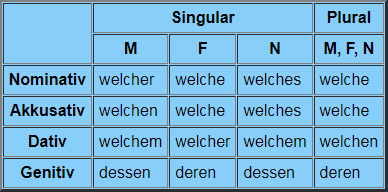
These forms can be used interchangeably with the der, die, das forms. Stylistically, the whelch- forms are not pretty, however. They are used to avoid a der, die, das sequence with articles, or when several relative phrases are strung, which easily results in a repetitiveness in style. Examples:
Er hob das Blatt auf, welches das Kind verloren hatte.
Die, welche die falschen Angaben gemacht hatten, werden bestraft.
Karl spielte nicht mehr mit Peter, welcher den Ball, der ihm gehörte, verloren hatte.
The Genitiv forms are identically der, die, das forms, q.v.
Welch- forms are used also as attribute to a noun that summarizes the contents of a factual prior statement. Example:
Ich schrieb ihm, er müsse das Geld zu dem festgesetzten Termin zurückzahlen, von welcher Forderung ich nicht abgehen würde. (Feminin Singular, Dativ)
(I wrote him he had to repay the money by the stipulated date, a demand from which I would not deviate; the demand summarizes the contents of the factual statement of the main phrase.)
The welch-pronouns can be used also interrogatively - e.g. "welches Zimmer?" - and as exclamation - e.g. "welche Ehre!".
 英语
英语 日语
日语 韩语
韩语 法语
法语 西班牙语
西班牙语 意大利语
意大利语 阿拉伯语
阿拉伯语 葡萄牙语
葡萄牙语 越南语
越南语 俄语
俄语 芬兰语
芬兰语 泰语
泰语 丹麦语
丹麦语 对外汉语
对外汉语

